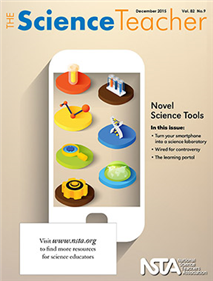All Resources
Journal Article
Turn Your Smartphone Into a Science Laboratory
Five challenges that use mobile devices to collect and analyze data in physics....
Journal Article
Using web-based maps to explore bird habitats and migration patterns....
Journal Article
Using probeware and online simulations to understand the greenhouse effect....
Journal Article
Persistence and a sense of purpose can propel you to the top....
Journal Article
Editor's Corner: The Future Is Now
The Science Teacher’s editor shares thoughts on the current issue....
Journal Article
Science 2.0: Did They Really Read It?
This column shares web tools that support learning. This month’s issue discusses tech tools that reinforce student attention and help teachers assess student work done independently from a teacher's direct observation....
Journal Article
The Green Room: The Pope's Message on the Environment
This column focuses on making your teaching more environmentally friendly. This month’s issue discusses Pope Francis's encyclical, which covers climate change....
Journal Article
Health Wise: Supporting Bullied LGBT Students
This Q&A style column provides up-to-date information on current health topics—helping students (and teachers) make healthy choices. This month’s issue discusses how teachers can play a critical role in preventing bullying of LGBT students and he...
Journal Article
Safer Science: A Healthier Science Class
This column provides best safety practices for the science classroom and laboratory. This month’s issue discusses how to prevent chemical hazards in the science lab....
Journal Article
Career of the Month: Earthquake Engineer
This column shares interviews with professionals using science in the workplace. This month’s issue describes Ron Eguchi's career path to becoming an earthquake engineer....



